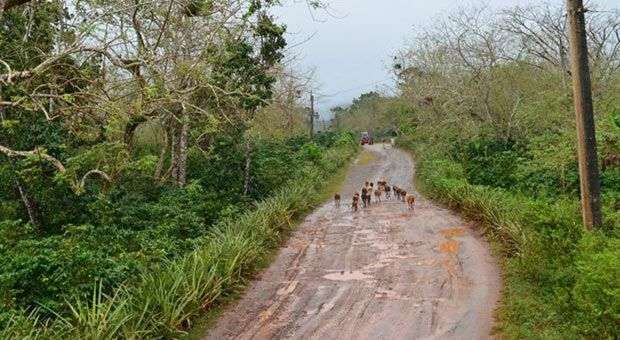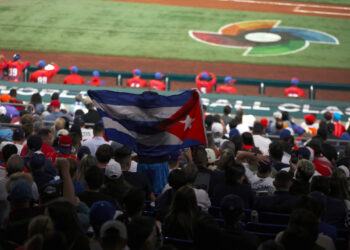1990 was a hard year to Cuba and of course, to any other place at the expense of the Gregorian calendar. Carlos Alberto Gonzalez is a handsome mulatto, a tall guy whose age is below 25 and who is thinking for a while that performance could be a good handhold where to rest the hopes in the last decade of a century less confusing than what people think. He’s in a bathing suit, rehearsing an old play that lets his body almost naked. He goes out to the courtyard of the Cabildo, which is the last stronghold by these years for theater people of Guantanamo province, leans his back against a rough and cold wall and lights up a cigarette. He spends about 30 or 35 seconds with it in his lips, until he suddenly takes it with his right hand and runs back to the dark room and said in a hoarse cry why not going for those hills of the Cuban east to make theater . He says why not going to see what’s out there, that theater is always the best excuse, and that that people will be endlessly grateful for an excuse like that.
…
And the early years, it is understood, were long years. Maybe someone else would say that those were the hard years. It was common going through the tip of the country without transportation, without food, with the strength of your legs and arms and sometimes with the inevitable regret of your will. You could make a novel from those early years, a good novel, or perhaps a fierce monologue, supposing that they both were not the same thing. Today there are just a few of those people, others have learned the route, establishing new contacts, recognizing an extraordinary geography and sizing up a climate that always offers groping unstable Februarys, full of cold and heat and rain and dust at the same time .
…
1993. End of the year. The Guantanamo Park is a dark swamp where you can hear every night the explosion of a mine. On the mine is the body of an exhausted man who is almost always a friend, a distant relative, or an acquaintance. The Theatrical Crusade is a project, an already done idea that has taken the hard and rough shape of Cuba of those years; the shape of the courtyard wall of an old rehearsal room, the shape of the body of a young man thinking on the last arteries of an inaccurate country. On this December night the unsuspected murmur of a knee on a mine reaches the park and also some dreams about Cuban theater, d etonated dreams that spread furiously through the minefield. Colleagues and friends do not give credit. Carlos Alberto Gonzalez is a happy guy who was a sapper in Angola and knows too well the range of each of these artifacts. Carlos Alberto Gonzalez is a handsome and reckless boy who left his life last night, without much fanfare, at the naval base.
…
Nowadays no one knows exactly what certainties were put into play twenty-three years ago in those hills; what delusions were generated under the nights of Vega del Toro or the desert dawns of San Antonio del Sur, or the foundations removed on the coast of Cajobabo or in the last shore in the country, at the foot of the Windward Passage. Those first children, suspicious at the sight of people who came from afar to dress up and act for them , have taken the form of grown men who work the land and come with their children, at night, near the stage. Grown men who appreciate the plays from a disturbing attention and who offer their homes and beds for the crusaders to sleep.
…
It might not be him because he had never said anything about that matter. It might not be him because these boys, these men and women who have passed next to him every day for the past few years did not notice anything. It might not be him because there are many Carlos Alberto Gonzalez who might be leaving the country at this precise moment. These guys are actors and actresses who can look at the public without watching a specific face and that right now, and not on any other stage, learn the value of certain scenic skills. That is why their gazes do not intertwine each other, that is why they move uncontrollably their mouth and still say phrases such as: who is the author of this idea?, do not be an ominous bird, shut your mouth, you should touch wood, or fuck, there’s not a piece of wood in this damn park. And they go to sleep to wash their faces early and know that nothing has happened, that they were fooled with that cheap rum, and that Carlos is alive and he is also still in Cuba.
…
Every day, at half past eight p.m., when they have already performed in ten remote schools, which are at two or more hours away, the actors take some air, come together at once and announce the beginning of the function through a choir that is already recognized in these places. ¨I’m going to Baracoa even if no road, even if no road, I’m going to Baracoa¨. It sounds simple. It is simple. The strict resolution of strongly violate, almost orgiastically, for a time right, some human miseries. The act of taking a bag on your shoulder and riding on a mule or a truck and begin traveling anywhere. By this time, it seems, there is not anything else.
…
It’s early, maybe too much, but some of these guys run, run several blocks with the faces still wet, very long blocks until they reach the corner of their house. Then the silence punctuated with some final confrontation slowly enters into them and gently places them, one beside the other, against a rough and cold wall that clearly understands little about life and death and desperation and the country and the theater, although it is now indefinitely linked to each of these things.
…
These guys, despite it may seem clumsy, are thirsty, hungry, and full of a boiling sweat which attacks their exhausted bodies. They are afraid of hard curves of some unthinkable paths. Roads that are not properly linked to any tourist destination, which consistently deny the help of a step, or at least, a bit of soft ground. They are also affected by for the solitude of the scrubland when the sun has already above it and has passed through the leaves. But they all have the common determination of not dragging up there, as far as possible, each of their generational signs.
But above all, they express an almost painful gratitude which slips from their eyes, a gratitude that does not negate the curves, nor the stones or the sun or the evening, but which apparently suits for some men.
…
1990 was a hard year to Cuba. At least we know that for sure. Carlos Alberto Gonzalez is a handsome mulatto, a tall guy whose age is below 25 and who is thinking for a while that things are changing, that something is not working and that theater will not be enough. But what the hell, he should not be an ominous bird, it is better to shut up or think of something else, it’s better touching wood but there is not wood, just a cold and rough wall, a very hard wall. Then he begins to move his mouth uncontrollably while suddenly he takes the cigar with his right hand and says in a hoarse cry, a blind cry as a mine explosion, why not going for those hills of the end of the country to make theater…
The Guantánamo -Baracoa Theatrical Crusade, which between January 28 and March 3 of each year reaches a considerable part of the Nipe -Sagua-Baracoa mountain massif, went very quickly beyond the outline of an idea, the intention of a single man. It also went beyond some obscure years of the country. Young people wonder things, the older ones are few. The theater is not enough, but who knows if at times could reach.










